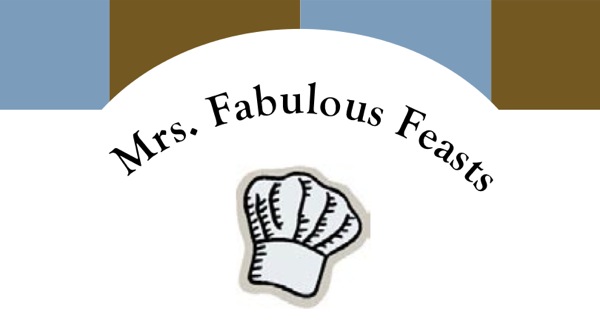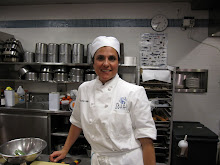We lined up in the stuffy hallway, an unwieldy snake of starched white interrupted only by our already red and sweating faces, just outside the production kitchen on the first floor of the French Culinary Institute. Some of use reviewed homemade flashcards, others talked and speculated what the practical and written tests marking the end of the 19 sessions of Level 1 would entail.
I had spent most of the day at my desk trying to anchor information into my post-menopausal brain, which is something like trying to affix an over-handled post-it note to your refrigerator...it just wants to drop off and flutter to the floor. I pressed on, nonetheless. I needed these to stick until around 9 pm: French culinary vocabulary, cooking times and temperatures, procedures for simple sauces like mayonnaise or veloute, basic techniques for making stock, braising a lamb shank, poaching fish in one of four different types of court bouillons... I took a break and peeled 4 potatoes and practiced the art of "tournage"....making perfect little potato footballs called cocottes....4-6 from each potato...a skill we'd have to demonstrate for the practical. I sliced carrots into little batons called jardiniere and turned jardinieres into little bricks called macedoine. Turnips ceased to be bulbous and homely and became delicate juliennes, thin and translucent. Chopped into pebbles, the julienne are now called brunoise and would help transform a plain broth into a Consomme Printenier.
We were finally allowed to file into the kitchen. At each station there was a cutting board and a bowl in which a turnip, carrot, potato and onion sat waiting to be peeled and shaped. I ended up at a station that faced the wall and straddled a sink and the compost barrel. In 30 minutes we'd have to make all our shapes, drop our knives, clean our stations, leave our student ID on the cutting board and leave the kitchen.
I knew I spent too much time on the turnips and ended up with too little macedoine of carrots and would lose points for that. I found out by chatting with my fellow students as we waited in the hallway that I'd screwed up by not keeping my potato trimmings submerged in water so they wouldn't turn pink. But, why? We were going to toss them in compost anyway! Well, in the professional kitchen universe we need to train ourselves to use every scrap, honor the food, fight waste and save money at every turn...those trimmings would make a fine mashed potato for that night's "special" or for a "family" meal for the staff. This is a lesson, if applied to our home kitchens, our industries and most of the western world in general, would go a long way toward saving the planet. So, even if we weren't going to save them TONIGHT, we should always treat the trimmings as though they could be saved. It was all about building habits.
I ended up with a 92 on the test. 10 out of 10 for organization, 10 out of 10 for cleanliness. 9 out of 10 for knife skills. 8 out of 10 for final product in cutting, 9 out of 10 for final product in cooking (not enough macedoine....a bit uneven perhaps? Not enough salt in the blanching water when I cooked them a l'anglaise?) I wasn't the best, but I was by far not the worst. Chef X gave us a little speech as he handed out the grades. "Some chefs give out 100's but I don't very believe in dat. How can you give a 100? There is no such thing as perfect in a kitchen. One minute your jacket is clean, then the next minute it's dirty, so how can that be 100? Your station is clean one time, but the next time I look there is a towel on your cutting board, so dat is not perfect. It happens, but what can I say? It's not 100! These chefs that give 100 they maybe want to make themselves look good!"
Or maybe they want to make their student feel good, feel accomplished, I think. What's wrong with that?! What is it about the French? Would it ever kill them to give you glowing praise? All of Chef X's compliments seem begrudging..."left-handed" kind of kudos that leave you feeling confused about whether you've been praised or dinged after all. This inevitably leads me to think about my father...not just to think about him, but to react viscerally, to feel my ancient history being triggered like a string of dormant land minds, by Chef X's rhythm of speech, his accent, his vaguely familiar humor and sarcasm, into feeling anger, humiliation and tears rising at the most inopportune moments.
A Frenchman, reared by a tyrannical chief-of-police French father, my father didn't believe in praise...it might make you into an "egoist", so was best avoided. I cannot remember a single time he told me he was proud of me or that I'd exceeded his expectations or that I was good at something. When I got good grades at school he took the credit saying it was only due to the fact that he pressured me or threatened me into performing at my best that I pulled A's or dean's list or won an award. Things I had passion or talent for (writing, singing, performing) he disparaged or dismissed as folly, or worse, a sign of my self-indulgent and selfish nature.
I'd knew I'd be stirring up a lot in culinary school, but I was thinking more in terms of French sauces....not the stew of my French-accented childhood.
Normally, we would move on to Level 2 and a new chef, but for some reason we've been assigned Chef X again for level 2. I hate the "every thing happens for a reason" cliche that gets thrown around when bad things happen and people want to be able to find a logical explanation to hold on to for it all...but I'm wondering if another 6 weeks of Chef X pushing my buttons isn't just what I need to "ecumer" the cauldron of bloody and bloated old feelings that have been bubbling over in my kitchen. If it helps me to take the cloudy stock of my old life and once and for all turn it into a clear, golden comforting consomme, then bring it on. When it's all over I'll be grateful for all the expert advice, techniques, habits and culinary lessons imparted by the chef, but I'll be most grateful for the unexpected gift he's giving me....a chance to heal some old wounds.
Ecumer: to skim off impurities such as blood and fat that rise to the surface of a simmering stock or sauce.
Wednesday, August 12, 2009
Subscribe to:
Post Comments (Atom)


5 comments:
very interesting . . . and beyond that a 92 no less! . . . I also can't help but wonder if Chef X and classmates have discovered Mrs. Fabulous' blog yet. . .
Beautiful writing. Healing old wounds...even harder than pleasing old tough chefs or fathers but...good for the soul once done. working on it myself.
Lovely writing.
Ellen...I'm trying not to think about anyone from class reading...don't want to censor...but staying on the polite side just in case! ...BJV...OLD FRIEND...I KNOW YOU KNOW WHAT I MEAN! Thankyou all for reading and commenting...
Hi, just discovered your blog from your comment on Smitten Kitchen's apple cider donuts. I love your writing, am intrigued with the experience of going to culinary school in one's 50s...and am very moved by the thought of turning working for a crusty old French chef into a cleansing and purifying experience instead of only feeling resentment and hurt. "Ecumer" indeed!
Post a Comment